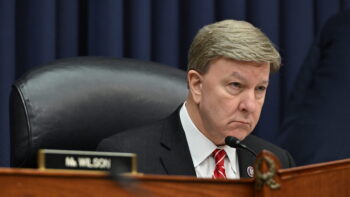
President Donald Trump speaks during an event at Joint Base Andrews, Md., Dec. 20, 2019.
WASHINGTON: In the shadow of two promised presidential vetoes, the House and Senate announced they reached agreement today on the 2021 National Defense Authorization Act, flatly rejecting the threats from President Donald Trump.
The president has threatened to block the bill unless Congress repeals legal protections for social media companies and removes language that calls for renaming Army bases named after Confederate leaders. But the agreed-to bill charges ahead irrespective of the president’s wishes. Of course, the president does not have an impressive track record when it comes to his veto threats of the defense policy bill. Trump has threatened to veto several NDAAs in his four years in office, backing down each time. And both houses seem resolute in their pursuit of an NDAA.
The newest of the two complaints lodged by Trump revolves around Section 230 of the 1996 Communications Decency Act, which provides protection for internet providers and social media companies against being held liable for what users post on their sites. Trump has complained bitterly about social media in recent months, accusing companies of discriminating against him and his allies as they spread disinformation about the results of the election.
The second threat is directly tied to language in the bill that would change the names of several Army bases named after Confederate leaders. Over the summer, Trump said he would be willing to kill the entire bill if that provision remained in the bill.
The House and Senate passed their versions of the defense bill earlier this year with bipartisan margins that would overcome a veto, but it’s not clear if that support would hold up under pressure from the White House.
The president has long enjoyed the support of Republicans on Capitol Hill who have been loath to run afoul of the presidential Twitter account. But Trump’s election loss may be emboldening some in the GOP. Senate Republican Majority John Thune rejected Trump’s Section 230 veto threat, telling reporters on Capitol Hill today that, “I don’t think the defense bill is the place to litigate that.”
Michigan Republican Rep. Paul Mitchell, who sits on the House Armed Services committee, also tweeted today that “as a member of House Armed Services I am disgusted with these threats to veto the NDAA. It is a strong bi-partisan DEFENSE policy bill. Not the place for a rush job last minute whack at social media.”
Air Force vet Rep. Adam Kinzinger sent a tweet, writing, “I will vote to override. Because it’s really not about you.”
The harshest response came from the Democrat chairman of the House Armed Services Committee, Rep. Adam Smith,
To be clear, Mr. President, Section 230 repeal wasn’t included in the House OR Senate version of the NDAA.
You’re mad at Twitter. We all know it.
You're willing to veto the defense bill over something that has everything to do with your ego, and nothing to do with defense. https://t.co/qsELyzU9O0
— Rep. Adam Smith (@RepAdamSmith) December 2, 2020
Smith and Ranking Member Mac Thornberry issued a joint statement today reminding the president of what’s at stake: “For 59 straight years, the NDAA has passed because Members of Congress and Presidents of both parties have set aside their own policy objectives and partisan preferences and put the needs of our military personnel and America’s security first. The time has come to do that again.”
Regardless of when the 2021 spending bill is finally approved, the 2022 budget release remains just around the corner. Breaking Defense reported last month that the Trump administration was planning on releasing the ‘22 budget before leaving office, a break with tradition in which the outgoing administration handed off its work to the incoming team. Of course, the next administration does not have to pay any attention to it and can build its own budget. Also, Congress has regularly ignored many of Trump’s spending requests, keenly aware that they alone possess the power to pass spending bills.
A draft of that 2022 budget, obtained by Defense One, calls for a $722 billion budget next year, a 2% increase from 2021.
The release of the budget is an attempt to box in the Biden team, setting up a scenario in which any cuts or changes could be decried by Republican lawmakers.
Speaking at a virtual Brookings Institution event this morning, Chairman of the Joint Chiefs Gen. Mark Milley said he saw any budget growth as unlikely.
“In an ideal world, I believe that we would need 3% to 5% sustained level of real growth in order to continue the modernization programs and the readiness programs” ongoing currently, he said.”But that’s also not necessarily going to happen, and I don’t anticipate that it will happen.”
The effects of the COVID pandemic on the economy, and the $27 trillion national debt, are likely to weigh heavily on the federal budget in the coming years. Milley acknowledged those stresses, saying “I suspect that the Pentagon’s budgets will start flattening out. There’s a reasonable prospect that they could actually decline significantly depending on what happens in the [economic] environment,” he said.
Even with the release of the 2022 budget early however, some analysts expect the incoming Biden administration to handle on the economic environment. “I don’t see this team really starting over,” and trying to build a new budget, said Elaine McCusker, a resident fellow at the American Enterprise Institute and acting DoD comptroller between 2017 and 2020. The competition with China, the growing strategic competition in the Arctic and in space are bipartisan issues that will make for a degree of continuity. “I think that they’re probably going to have a really deep understanding already of the strategy, the processes and the budget, so they’re going to put their mark on things but I don’t expect they’ll want to start over” completely, she said.
Major trends and takeaways from the Defense Department’s Unfunded Priority Lists
Mark Cancian and Chris Park of CSIS break down what is in this year’s unfunded priority lists and what they say about the state of the US military.


























